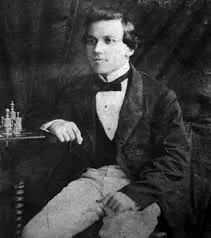Real Celebrities Never Die!
OR
Search For Past Celebrities Whose Birthday You Share

source:wikipedia.org
Paul Morphy
Birthday:
22 Jun, 1837
Date of Death:
10 Jul, 1884
Cause of death:
Stroke
Nationality:
American
Famous As:
Chess player
Age at the time of death:
47
Paul Morphy's Quote's
Introduction to Paul Morphy
Paul Morphy, an American chess prodigy, is widely regarded as one of the greatest chess players in history. Born in New Orleans, Louisiana, into a prominent and affluent family, Morphy developed his chess skills at a young age by observing his father and uncle’s games. He quickly surpassed them in ability and demonstrated remarkable talent as a child prodigy, defeating numerous formidable opponents, including the renowned Hungarian master Johann Löwenthal in 1850.
Education and Early Career
While Morphy studied law at the University of Louisiana (now Tulane University) and completed his degree in 1857, he was not yet eligible to practice law. Instead, he decided to pursue his chess career. In 1858, he embarked on a journey to Europe, where he challenged and triumphed over the continent’s top players, such as Adolf Anderssen, Daniel Harrwitz, and Howard Staunton. Additionally, Morphy emerged victorious in the inaugural American Chess Congress in 1857 and unofficially claimed the title of World Chess Champion in 1858.
Playing Style and Sportsmanship
Morphy was renowned for his exceptional ability to combine moves, his instinctive understanding of positional strategies, and his mastery of all aspects of the game. His style of play was characterized by a romantic flair, with a preference for open positions and a willingness to sacrifice material in order to seize the initiative. Additionally, he was known for his sportsmanship and adherence to the customs of chess, always displaying respect towards his opponents. To make the game more captivating and fair, Morphy often offered his opponents advantages such as a pawn or an extra move.
Retirement and Later Life
At the height of his fame and skill, Morphy made the decision to retire from chess. He returned to his hometown of New Orleans and attempted to establish himself as a lawyer, but unfortunately, he was not successful in this endeavor. Throughout his life, he experienced various physical and mental ailments, which contributed to his withdrawal from society and eccentric behavior.
Final Days and Death
Paul Morphy spent his final days in New Orleans, where he had lived most of his life. On July 10, 1884, at the age of 47, Morphy was found dead in his bathtub. The autopsy revealed that he had suffered a stroke, likely brought on by entering cold water after a long walk in the midday heat. Morphy, a lifelong Catholic, was buried in the family tomb at Saint Louis Cemetery No. 1 in New Orleans.
Legacy and Impact on Chess
Morphy left behind a remarkable legacy in the world of chess. Despite his brief competitive career of less than two years, he is considered one of the greatest chess players of all time. Morphy revolutionized chess strategy with his emphasis on rapid development and open positions. His games continue to be studied and admired for their tactical brilliance and strategic depth. Morphy’s influence extended beyond his playing days, as he inspired generations of chess players with his aggressive style and creative sacrifices.
Remembering Paul Morphy
Today, Paul Morphy is remembered as a chess prodigy whose impact on the game far outlasted his short career. His innovative approach to chess, combining tactical prowess with positional understanding, laid the foundation for modern chess theory. Although he retired from competitive play at just 21 years old, Morphy’s contributions to chess continue to be celebrated, cementing his place as one of the most influential figures in the history of the game.
Name:
Paul Morphy
Popular Name:
Paul Morphy
Gender:
Male
Cause of Death:
Stroke
Spouse:
Place of Birth:
New Orleans, Louisiana, U.S.
Place of Death:
New Orleans, Louisiana, U.S.
Occupation / Profession:
Personality Type
Protagonist: Paul Morphy was very strategic and logical in his approach which translated into success on the chess board.
He is considered one of the greatest chess players in history.
His playing style was aggressive and focused on tactical brilliance
Morphy defeated many top European players during his short career
Morphy never played professionally and retired from chess early
Paul Morphy became the unofficial world chess champion at the age of 21
Paul Morphy won the first Merican Chess Congress in 1857.

